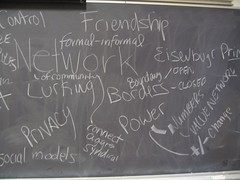Every time I re immerse myself in thinking about the space between communities and networks, my mind races. I should be doing April billing, prepping for travel, finishing editing, yet I keep jumping into conversations with my networks and communities about NETWORKS and COMMUNITIES! This morning we had a great one on Twitter and I wish I could drop everything, keep conversing and then reflecting. But I can’t. So here is the marker for the conversation, as best I could capture it by favoriting all the related Tweets –> Twitter Network – Community Conversation. If someone can continue to hold the space for this conversation as it wanders across media, please, I thank you in advance. There are some FABULOUS thoughts from aroberts, csessums, edmittance, band, budtheteacher, peterscampbell, stevebridger, melmcbride, CourtneySellers , injenuity
, nandito, coyenator, webb and MtnLaurel. THANKS!
Month: April 2008
Want to take your blogging to the next level?
People ask me, “how do I become a better blogger and how can I make money at blogging?” There are tons of great resources out there on how to become a better blogger, and I usually don’t have a good answer for the second part. But today an email from Ben Rattray of Change.org gave me a thought. Change.org is looking for paid bloggers around activist issues. There is a monthly stipend – I’m sure it isn’t huge, but this is a paid gig. It offers a good writer the chance to hone her skill, get exposure and street cred as a paid blogger. And heck, while doing some good! It’s a good combination. Check it out…Change.org
Want to blog on an issue you are passionate about for an audience of hundreds of thousands of activists and nonprofit leaders?
Want to create the premier online space for your issue and become a leading voice for social action?
Change.org is launching a social action blog network this summer and is currently hiring a team of part-time bloggers/editors to help create a movement for change around the major causes of our time.
Each blogger will lead an online community focusing on a different social, political, or environmental issue, maintain a daily blog covering news and offering commentary, convene leading nonprofits and activists working on the issue, and help people translate their interests and passions into concrete action.
More on community management (part 3 or “what’s in a name”)

![]() photo credit: os♥to
photo credit: os♥to
I hate titling these blog posts with the words “community management.” After writing post 1 and post 2 on this topic (triggered by Chris Brogan), the words just feel wrong. But because this is the label that has been floating across our blog conversations, I’m keeping it in as “connective tissue.” I was actually thinking about “The Giant Ear!”
So why am I writing a third post in three days on community management? (Instead of going for a walk this morning. Uh oh.) It is “in the air.” For those who have had a baby, it’s like once you get pregnant, all of a sudden you notice all the other pregnant women walking around town! Once you start putting blogging your ideas on something, you notice others who have thought/said/tickled around the same thing. The waves of blogging conversations about community management seem to be washing on the shore closer together these days.
While catching up on some feeds, I saw Matt Moore’s bit on
chief conversation officer.
Organisations need Social Media Relations people. And because of the participatory nature of the social media, these people will have to blog. And comment on other blogs. And Twitter. And all that other stuff. They will encourage, advise and look out for bloggers and social media headz in their own organisations. And they will have to believe in what their organisations do (be it curing cancer or causing it) or else they will get found out.
Everyone wants to be Chief Talking Officer. Who wants to be Chief Conversation Officer?
Hm. Matt is talking about something different than this animal we’ve been calling community manager, but some of the functions he lists hearken back to Chris’s list. But do you feel the dissonance that I do? Just the title “officer” shows us the polarities that we activate when trying to reconcile a network activity with a corporate structure.
Control <–> Emergence
Talking <–> Listening
Planned <–> Evolving
Being in charge <–> Being able to be an effective network actor
We are recognizing these polarities or tensions. (YAY!) They are showing up in thousands of blog posts and creeping into books. They emerge from deep roots and cannot be ignored or wished away. Yet it seems to be hard to talk about them within organizations and even the “job descriptions” we see more of every day. (Check the listing of online community manager blogs on Forum One’s site or on Jake McKee’s.)
Let’s make them discussable, and we can discover the way forward. Let’s discuss them — with every boss and leader who will listen. Let’s encourage the network around organizations to tell them how they feel about being managed – or listened to. Let’s find a way to use the power of the network for our organizations, and with it, the multiplied, nested power of the communities that live in and spring from the network. (Oh heck, I’m getting all riled up and haven’t even had a cup of tea this morning!)
To circle back to this idea of “community manager,” and what it is becoming in a network age, the first thing is to be brave enough discuss the idea that it may be “management” in the frame of business structures and some “older ways” of doing things, but in terms of the action in the network, it is not management as we know it. It is is about being connective tissue between an organization and the world/network it lives within. It is about activation, listening, pattern seeking and then bringing that back into the current context of the organization – at whatever stage that organization is in becoming a network organization. It is about reconciling that businesses, in their interaction with the world (customer, vendors, regulators) have opened the door to a new way of being in the system that requires more than management. More than measurable data. More than targets and goals. It requires intuition, intellect and heart.
Heart? Community Managers and HEART she says? INTUITION???
Yes. Heart and intuition, but not in the absence of intellect. Because systems include that beautiful, irrational, impulsive part of human life – emotion. “Community” and “network” both imply human beings. The person you entrust to guide and represent and help your organization learn – this person we have been calling the “community manager” – is your person who stewards your connection to both hearts and minds. Who listens with every available channel, including intuition. How do you measure your ROI on intuition? On heart? I’d ask, what are you losing every day by ignoring them.
So what would you call that role? Magician? The Giant Ear? Elder? I’m currently stumped.
(edited later for a silly typo)
Seven psychological complaints of bloggers and social media addicts
Too funny and right on….Seven psychological complaints of bloggers and social media addicts . Not a video, but a Monday funny!
Musings on “community management” Part 2
 My last post was on the ground, in-the-flow practical stuff of online community management in response to Chris Brogan’s great post, On Managing A Community . This one climbs up to meta-ville a bit and asks a couple of questions.
My last post was on the ground, in-the-flow practical stuff of online community management in response to Chris Brogan’s great post, On Managing A Community . This one climbs up to meta-ville a bit and asks a couple of questions.
Are we talking about communities, or are we embarking on the era of network facilitation?
If you read between the lines and through the comments on Chris’s blog I think he has begun to tease out some of the differences between community and network management! (I’ll come back to that word “management.”) Read through his goals which I think are different than what we have come to expect for what I’ll call “traditional online community management.” In the past this has been about the inward set of processes around hosting, moderation and facilitation of web based discussion communities – large or small. He speaks of outreach, of reputation of an organization in the world, and of mechanisms of learn from and with groups of people and even the wider world. It is an outward looking role, not inward. It is about spawning connections, not keeping existing connections organized.
This is not your mother’s discussion board, sweetheart!
When we move to the network, a couple of things happen. The notion of managing becomes even more of an illusion than managing that herd of cats called “community.” (By community, I mean a bounded set of individuals who care about something and who know they are members and interact with each other over time.)
Instead we are talking about scanning for things important for our organizations – conversations about us, niches or needs we can fill, feedback and suggestions for improving what we do. It is filtering and redirecting those messages to where they can do good. It is a little bit like listening to the universe.
Instead of managing conflict or spammers in a walled community, we are seeking to make connections between people that advance our organization’s learning and goals. That includes between disgruntled people and the people who might address that problem, between ideas, links and content to people who might use them, and between communities that exist within the humus of the network garden.
Instead of spawning or archiving threads, we are tagging and remixing. Instead of inviting in or kicking out members, we are mapping the network of relationships, looking for where to respond, and where to catalyze action.
These are not the list of community management skills we have come to know since the first big upswing in online communities in the mid 1990’s. We have moved to from community to network…. what is the word?
If we are talking about communities, are we really talking about managers?
I don’t think it is management in the traditional sense, in the sense of control and mold (or even “facilipulate” – manipulate+facilitate!). It is about sensing, scanning, filtering and connecting. And, it is about learning. Facilitating learning. Living the learning and creating the next iteration of that learning. It is about stewarding technology as wave upon wave of new tools crashes upon our organizations.
It is about weaving between the community and the network.
What the heck would this job be called? Which organizations have the foresight to invest in it — and realize that those who help them weave their organizations in and out of the networks will benefit most from those networks? If we were looking for this person, what skills would they show up with? What would their traces across the internet look like?